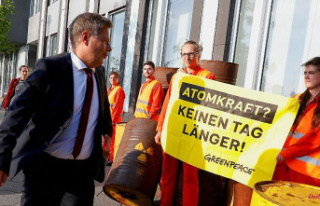In Leipzig, left and right-wing groups are calling for protests against the government's energy policy. Counter-demonstrators block the elevator of the right-wing extremist alliances. Meanwhile, 2,000 people gathered in Magdeburg for an AfD rally.
In Leipzig, several thousand people demonstrated against the high energy prices. According to estimates by observers, more than 2,000 people took part in a rally and a procession by the Left Party under the motto "Hot autumn against social cold". At the same time, around 1,000 supporters of right-wing groups such as the small Free Saxony party protested in the immediate vicinity.
According to the police, counter-demonstrators repeatedly blocked the elevator of the right-wing extremists on the inner city ring road in the evening. After a blockade by around a hundred counter-demonstrators, the right-wingers shortened their procession and returned to their starting point. The police were deployed with a larger contingent to separate both camps on Augustusplatz in the city center and in the subsequent elevators.
There were repeated attempts by counter-demonstrators to disrupt right-wing groups' elevators. According to a police spokesman, there were several scuffles. Right-wing extremist groups had already tried in advance to give the impression that they were pulling in the same direction with the left. Both camps also symbolically based their protests on the Monday demonstrations in the former GDR.
The Monday demonstrations are also controversial within the Left Party because of their symbolism and because of the risk of a lack of differentiation from the right. "We won't let the protest take us away," said Left Party leader Martin Schirdewan at the demonstration in Leipzig. It is "our fundamental democratic right to take our protest against the traffic light onto the street". The initiator of the demonstration, the left-wing member of the Bundestag Sören Pellmann, emphasized again that his party did not want to "damage or abuse" the Monday demonstrations.
Speakers at the left-wing demonstration, including the parliamentary group leader Amira Mohamed Ali, criticized the energy policy of the traffic light federal government made up of SPD, Greens and FDP. Measures such as the gas levy aggravated the social situation of many people in view of the high energy and living costs.
The Monday demonstrations, which culminated in a peaceful revolution in the GDR in 1989 and the fall of the Berlin Wall, have been used in recent years, especially by right-wing groups, as a label for protests against the Corona measures. The Leipzig police were supported in securing the demonstrations on Monday evening by the Saxon riot police and the federal police, among others.
More than 2000 people came to a rally of the AfD parliamentary group on the cathedral square in Magdeburg against the rising cost of living. In their speeches, several parliamentary group members emphasized that the federal government's measures to relieve the burden on citizens were not sufficient. They criticized foreign and environmental policies and called for an end to sanctions against Russia.
Group leader Oliver Kirchner announced several motions and a current debate on the subject of price increases for this week's state parliament session. At the end of the event he sang Marius Müller-Westernhagen's song "Freiheit" and played the guitar. There were also demonstrations on socio-political issues in various other cities in Saxony-Anhalt in the evening.












